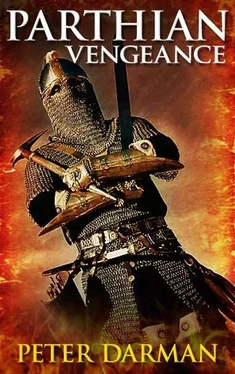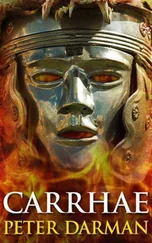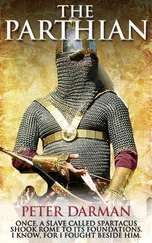Peter Darman - Parthian Vengeance
Здесь есть возможность читать онлайн «Peter Darman - Parthian Vengeance» весь текст электронной книги совершенно бесплатно (целиком полную версию без сокращений). В некоторых случаях можно слушать аудио, скачать через торрент в формате fb2 и присутствует краткое содержание. Год выпуска: 2012, Жанр: Исторические приключения, на английском языке. Описание произведения, (предисловие) а так же отзывы посетителей доступны на портале библиотеки ЛибКат.
- Название:Parthian Vengeance
- Автор:
- Жанр:
- Год:2012
- ISBN:нет данных
- Рейтинг книги:5 / 5. Голосов: 1
-
Избранное:Добавить в избранное
- Отзывы:
-
Ваша оценка:
- 100
- 1
- 2
- 3
- 4
- 5
Parthian Vengeance: краткое содержание, описание и аннотация
Предлагаем к чтению аннотацию, описание, краткое содержание или предисловие (зависит от того, что написал сам автор книги «Parthian Vengeance»). Если вы не нашли необходимую информацию о книге — напишите в комментариях, мы постараемся отыскать её.
Parthian Vengeance — читать онлайн бесплатно полную книгу (весь текст) целиком
Ниже представлен текст книги, разбитый по страницам. Система сохранения места последней прочитанной страницы, позволяет с удобством читать онлайн бесплатно книгу «Parthian Vengeance», без необходимости каждый раз заново искать на чём Вы остановились. Поставьте закладку, и сможете в любой момент перейти на страницу, на которой закончили чтение.
Интервал:
Закладка:
‘It is my intention to return to Parthia,’ said Mithridates, ‘to punish those who have rebelled against me and conspired to steal my throne. I requested this meeting to propose an alliance between our two great powers to achieve this end.’
Gabinius was already bored. The information he had received concerning this Mithridates had revealed that he was the loser in a Parthian civil war and therefore had no power with which to reclaim his realm. The governor smiled politely and was about to say that it was not within his power to make alliances with foreign powers.
‘You would be richly rewarded for such assistance,’ added Mithridates.
Gabinius smiled again and suddenly became much more interested in what this foreign king had to say.
As a proconsul he had the authority to raise troops and make war on Rome’s enemies, though he had no interest in his own treasury funding such endeavours. Wars could be ruinously expensive. However, if the funding came from elsewhere then he might consider conducting a campaign in the east. It was true that he had already made plans to capture the oasis of Palmyra, both to put an end to the troublesome Agraci threat and to take control of the lucrative trade that passed through the oasis settlement, but that expedition would more than pay for itself when he had control of Palmyra. He was wary of other adventures that might be expensive for very little reward.
‘Why would I make war on Parthia?’ queried Gabinius.
‘To ensure its ruler is a friend of Rome,’ answered the queen.
‘Who is the current ruler of Parthia?’ asked Gabinius.
Mithridates’ eyes narrowed. ‘Orodes, my stepbrother.’
‘No friend of the Romans,’ added the queen.
‘His main ally is a traitor named Pacorus, a man who was a slave and fought against the Romans,’ Mithridates spat the words with venom.
‘I have heard of this man,’ said Mark Antony, rubbing his aquiline nose with a finger.
‘Man?’ said Aruna dismissively.
‘As have I,’ said Gabinius. Pompey had spoken of him admiringly when he had returned to Rome, and of the peace they had both agreed, though the governor had an altogether different opinion of this foreign king who had refused to hand over a killer of Roman soldiers.
‘But did you know that he is also a friend of the Agraci,’ said Mithridates, ‘the scourge that torments both our peoples?’
‘I did not,’ admitted Gabinius, whose opinion of King Pacorus was lowering by the minute. ‘Though I do know that he is a friend of Jews who kill Romans.’
Gabinius went on to inform Mithridates about a man named Aaron who was the treasurer at Dura Europos and who was wanted for the murder of several Roman soldiers in Judea.
‘I have also heard rumours that this Aaron is a friend of a Jewish prince named Alexander,’ remarked Mithridates.
‘Alexander Maccebeus?’ asked Mark Antony.
‘I do not know,’ replied Mithridates, ‘but other rumours tell of the armouries at Dura Europos sending weapons to this Alexander with the assistance of the Agraci.’
‘You said that Rome would be richly rewarded for its assistance, said Gabinius, changing the subject.
Mithridates smiled at the governor. ‘Assist me and I will reward you from the great royal treasury at Ctesiphon, the seat of Parthian power and only three weeks’ march from Syria. Once I am reinstalled on my throne I will give you three thousand talents of gold for your support.’
Gabinius tingled with excitement. Three thousand talents amounted to a hundred tons of gold. He licked his lips. A campaign in the east was suddenly very appealing.
‘I think, King Mithridates,’ replied Gabinius, ‘that you can look forward to being back on your throne very soon. All that remains is to finalise the details. I will send one of my officers to inform you of the date of our departure when all the arrangements have been made.’
The couriers broke into applause at this news while the queen laid a hand on her son’s arm and smiled at him. Mithridates raised a hand to still the noise.
‘You will not forget about King Pacorus?’ he said.
‘No, sir,’ replied Gabinius, ‘you can be certain that he is high on the list of my priorities.’
‘He needs to be dealt with,’ said Aruna.
‘He has a sorceress,’ added Mithridates seriously.
Mark Antony laughed and Gabinius bit his lip trying not to. These eastern types! How ridiculous they were in their brightly coloured robes with their long hair, beards and effeminate ways. No wonder Pompey had conquered this area with such ease.
The same fat courtier who had shown them into the room fussed around them as they took their leave of the royal guests. In the corridor outside Gabinius halted to question him.
‘What is your name?’
‘Ashlen, highness,’ replied the fawning courtier.
‘Who was that sour-faced young man dressed in the yellow tunic? He appears not to like Romans.’
Ashlen looked momentarily alarmed. ‘No, highness, not all at. That is Nicetas, highness, the youngest son of King Narses who was most tragically recently killed at Susa. He thirsts for revenge against King Pacorus.’
‘That is the second time we have heard that name today,’ commented Mark Antony.
Later that afternoon, after Gabinius had returned to his spacious villa, he relaxed on the balcony taking wine with his cavalry commander where they were joined by the tribune Marcus Roscius, one of the rising stars among his legionary officers. The mood of the proconsul had brightened considerably since earlier.
‘So this King of Dura Europos, this Pacorus, has been supplying weapons to the Jews,’ said Mark Antony.
Gabinius nodded. ‘It would appear so.’
‘Such a thing cannot go unpunished.’
He looked at Mark Antony, who was anticipating the prospect of war and glory with relish.
‘Before we embark on a war with the Parthians,’ said Gabinius, ‘we need to know more about our enemies. Marcus, you have travelled to Dura and met with this Pacorus. What are your impressions of him and his kingdom?’
‘The walls of his city are very strong, governor,’ replied Marcus.
‘Walls can be breached,’ sniffed Mark Antony dismissively.
‘He also has soldiers equipped like our own and there appear to be many of them,’ continued Marcus.
‘And what of the king himself, this Pacorus?’ pressed Gabinius.
‘We know that he was taken as a slave and shipped to Italy where he fought alongside Spartacus during the slave revolt,’ replied Marcus, ‘and that since his return to Parthia has won many battlefield victories. Many talk of his army with awe.’
Mark Antony waved a hand in the air. ‘Idle gossip for old women. We must bring him to account. The fact that has he been aiding the Jewish rebels is itself a declaration of war against Rome.’
Gabinius nodded. ‘It is as you say, Mark Antony. We cannot allow a foreign power to interfere in Rome’s affairs without punishment. As I was planning a strike against Palmyra anyway we will expand the area of operations to include the domain of King Pacorus, which with Palmyra will be absorbed into Roman Syria.’
‘And what of Mithridates, governor?’ asked Mark Antony.
‘I think we may be able to turn his appearance at Antioch to our advantage. After we have captured Palmyra and Dura there is no reason why we cannot cross the Euphrates and reinstall Mithridates back on his throne.’
‘As a client king,’ said Marcus.
Gabinius smiled. ‘Naturally. I intend to do to Parthia what Pompey did to Armenia and Pontus.’
No Roman had attempted to subjugate the Parthian Empire, but Gabinius knew that there would never be a better opportunity to conquer it. Parthia was exhausted by years of bloody civil war and he had received word that Armenia was about to commence hostilities against the Parthians on their northern borders. He knew that Crassus aspired to conquer Parthia and extend Roman rule as far as the Indus, but Crassus was not here and it would take him months to march his army overland from Italy. Gabinius’ two legions, thousand horsemen and the auxiliaries he would raise would be more than enough to deal with a motley band of Agraci nomads and the decadent troops of Parthia. He remembered reading the reports of the war waged by Lucullus in the Parthian Kingdom of Gordyene and the ease with which Roman troops had defeated the enemy.
Читать дальшеИнтервал:
Закладка:
Похожие книги на «Parthian Vengeance»
Представляем Вашему вниманию похожие книги на «Parthian Vengeance» списком для выбора. Мы отобрали схожую по названию и смыслу литературу в надежде предоставить читателям больше вариантов отыскать новые, интересные, ещё непрочитанные произведения.
Обсуждение, отзывы о книге «Parthian Vengeance» и просто собственные мнения читателей. Оставьте ваши комментарии, напишите, что Вы думаете о произведении, его смысле или главных героях. Укажите что конкретно понравилось, а что нет, и почему Вы так считаете.












